Rebuilding Community on the (Fujo)Web, pt. 2 — We Need to Talk About Power
Why Power is a Complex Thing™, and how learning its secrets helps us contextualize "what is wrong with the internet" today
Table of Contents
This was originally a talk given at the 2024 edition of CitrusCon to a public of Boys Love media fans—one of the online communities most impacted by the current state of the web. Check it out on YouTube, or read on!
Previously on “Rebuilding Community”…
Missed part 1? Find it here!
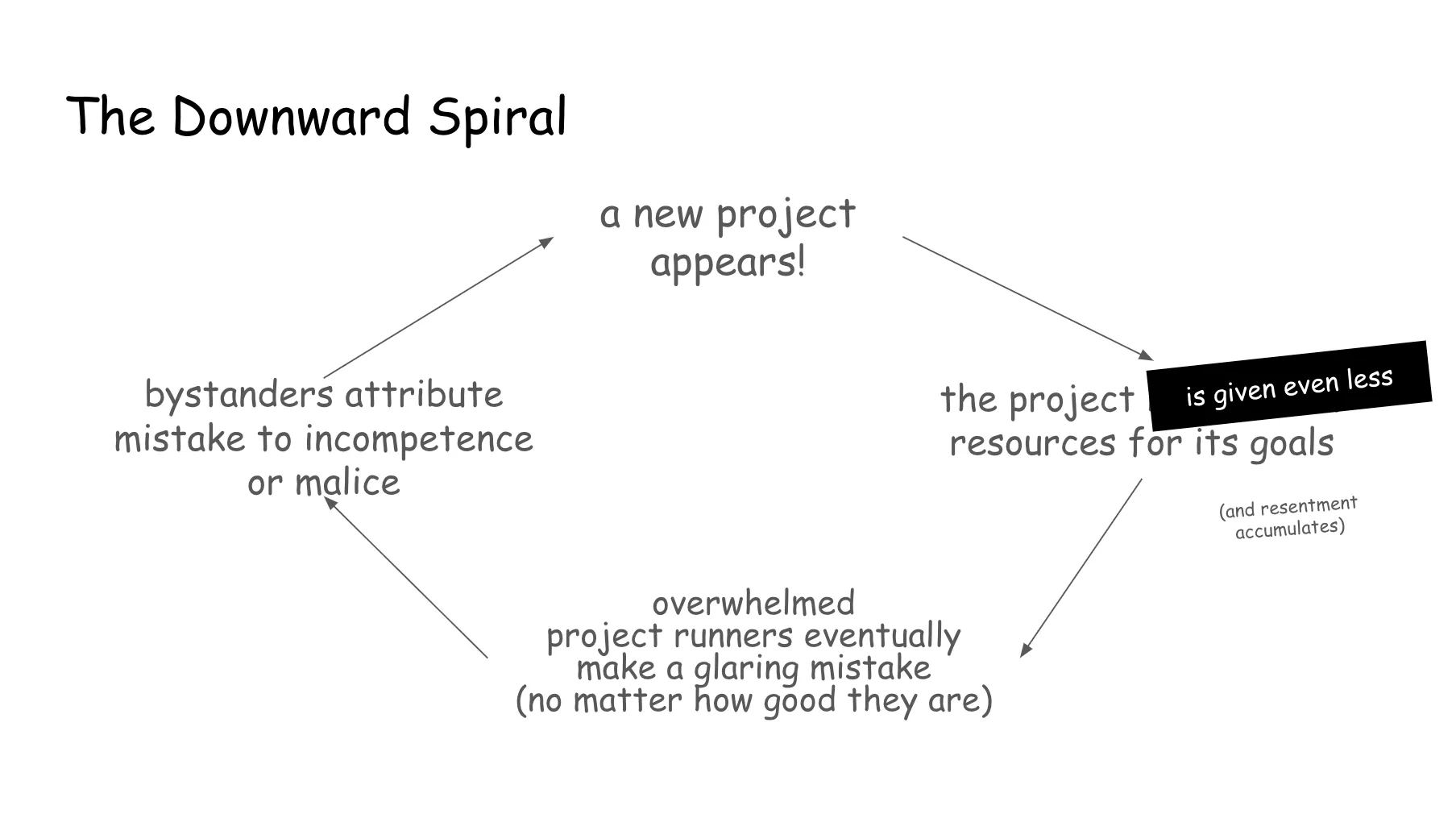
Independent projects for the social web are caught in a downward spiral! Faced with impossible odds and outsized expectations, project maintainers face unsustainable levels of burnout. Even worse, each new failure (a foregone conclusion given the situation) makes it even harder for new attempts to succeed. This perpetrates a cycle of apathy and resentment in our communities.
How can we come out of this cycle? Doing less is by itself not enough; getting more money helps, but independent fundraising cannot match the investment VC capital injects into modern software; is getting volunteers to help the solution we seek?
As they say, “every problem is a people problem”. And there’s only one way to understand why projets struggle to move past a few individuals carrying a disproportionate load, even when seeking intra-community help:
Talking About Power

Now, this may feel like it’s coming out of left field, but bear with me. Let’s go back to that fateful day when those posts were published1: after seeing other project leads talk about the toll of running projects, the frustration me and my collaborators had been feeling spilled over, and we found ourselves discussing our struggles openly within our communities.
While the discussion was at times raw, we found that rather than creating fear, uncertainty or resentment and causing people to retreat, openly sharing our frustration instead renewed a sense of closeness and comradery, with more people coming forward to ask what they could do to help. After those discussions, we did see a vibe-shift in our spaces. Obviously, that didn’t fix all our issues—and yet, why did something change?
For a while, my answers were fairly simplistic. It wasn’t until I read about other groups having similar experiences that I got to better understand the role power played.
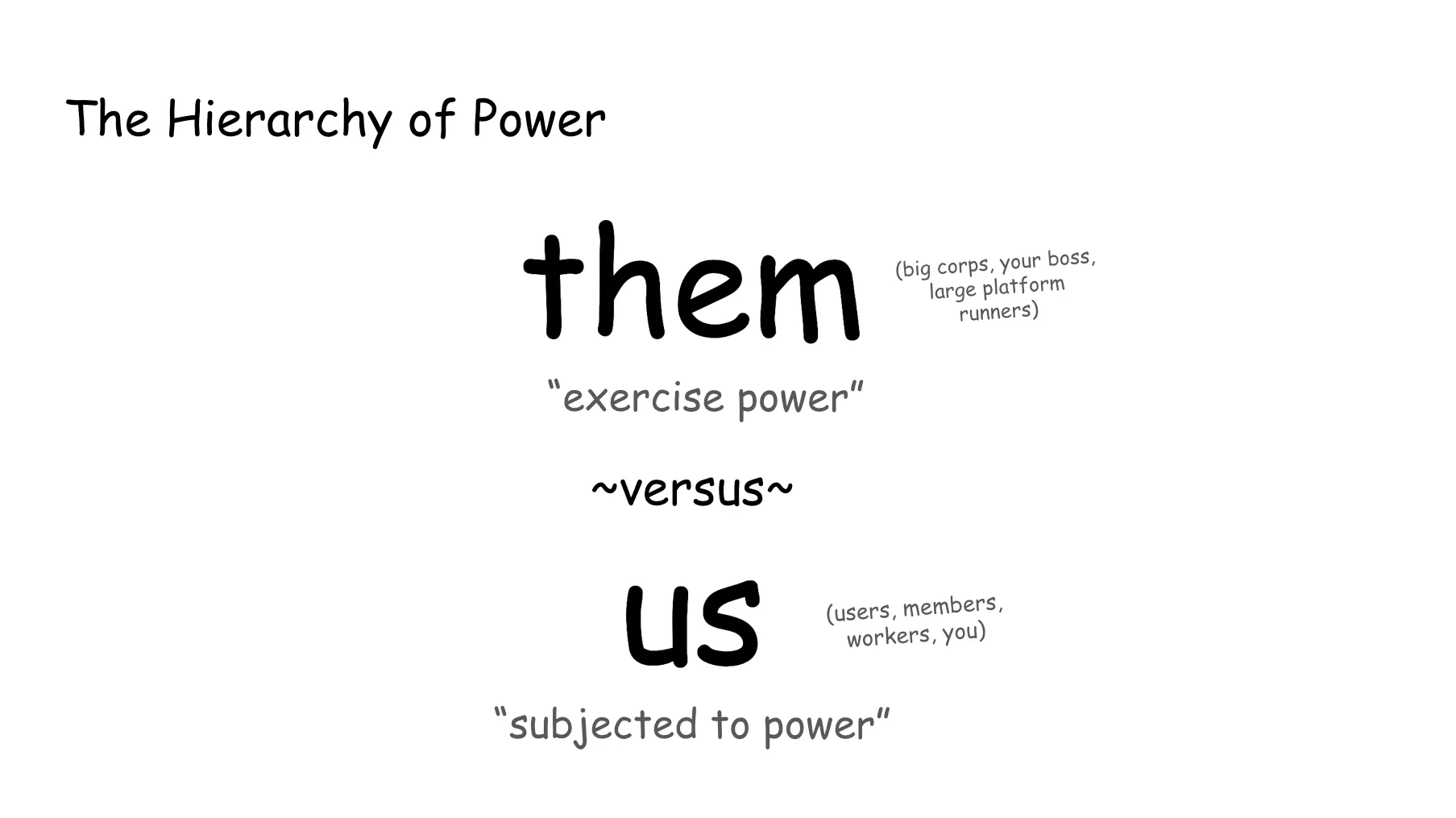
Now, the world as it has existed for a long time overwhelmingly rests on hierarchical power structures. This means we often tend to perceive our relationship with the world as an “us” and a “them”, two separate entities, one above and one below, one with power and one subjected to it. Unfortunately this is so ingrained inside and outside us, as to be inescapable.
So when you have people like us small platform runners (but not only) that aren’t quite as powerful as those often slotted in this “them” group, but that still do have some power, where do we go? You may think, “well, it depends on the person”. And that’s true! Power is not an absolute thing, power only exists in the context of a relationship.

Now here’s the thing: indie projects are often born as a rebellion against large tech platforms, with the desire to shift the balance of power and put it closer to the users. But shifting who is in power doesn’t change that a hierarchy exists, no matter what intentions the power shift is born with.
Groups like ours that are overwhelmingly full of queer, disabled, poor, and otherwise marginalized individuals, have often been betrayed and mistreated by those in power. Because of this we’ve justifiably learned to be suspicious of anyone who has it or seeks it. At the same time, we’ve so often been stripped of our own power and agency, that we may perceive those who wield it as fundamentally different.

Because of this, small platform runners can end up in the “them” group (often subconsciously), even for the people we’re here to serve and help. This is not true for everyone, nor it is a fixed thing.
I’ve seen this happen first hand: what is a often long-time peer relationship, even a friendship (in a way an “us”), can suddenly take an “us vs them” feel the moment I find myself having to step into a role that has power. Eventually as long as someone is in power, the us versus them is still there.
Where there’s power people will either passively submit, leaving all the responsibility in the hands of “leaders”, or actively rebel, antagonizing those above them.
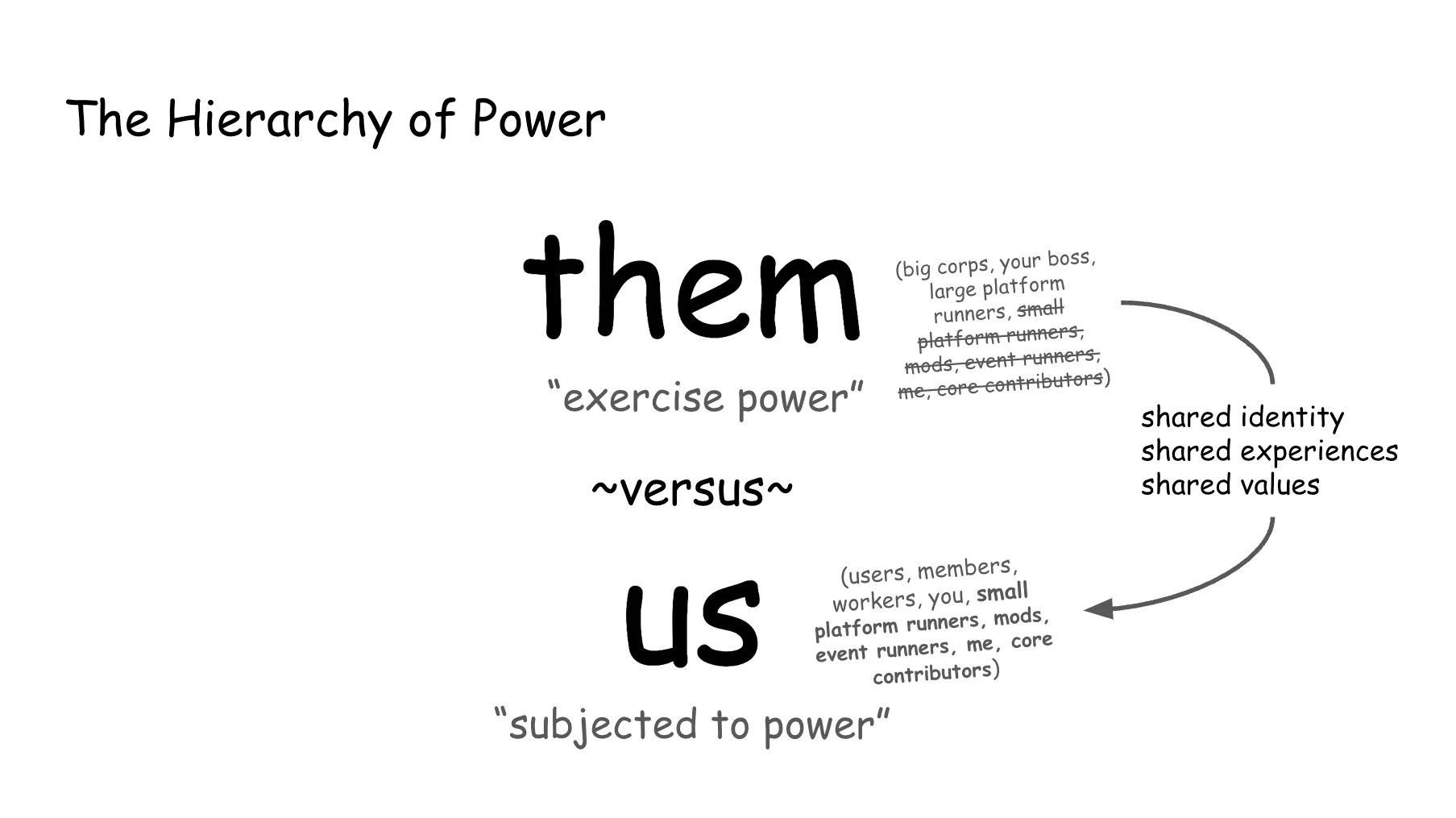
However, when people saw us come forward with our frustration and pain, and express the overwhelming weight of what we were carrying, it made it harder to continue the narrative of us vs them, platform user vs builder, server members vs moderators, person who can’t and person who can. After that discussion people saw us for who we truly are: members of their same community that, for all their weaknesses and faults, are trying to build something that makes a difference.
Once people saw the barrier drop, we were able to level the playing field, and it became easier for us to ask for help, and easier for others to give it. It made it easier for people to empathize with us and give us the grace we sometimes need. Now if you’re jumping in your seat going “I know how to fix this! I know how to fix this! Let’s get rid of hierarchy and power”, don’t worry: we’ll get there.
But before we do, let’s talk about different types of power.
Types of Power

They say knowledge is power, and indeed one of the most powerful things we can do is to know more about it. So… We all deal with power in our lives, but we tend to have an oversimplified view in which power exists as a single entity. In reality, power takes many different forms.
Power-Over
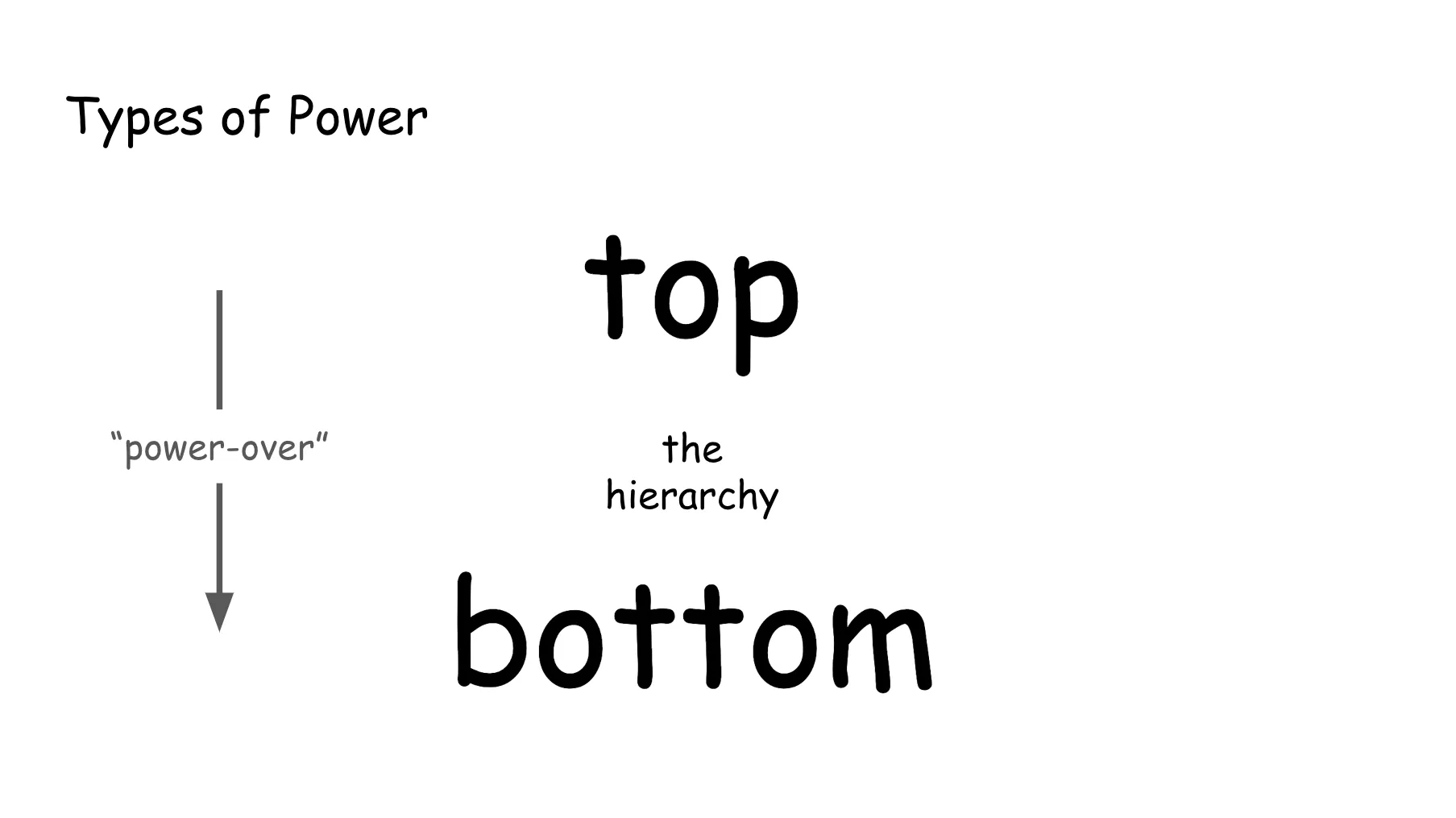
We’re all familiar with power-over. This is the classic type of power that flows from above to below: often wielded through fear, shaming and bullying, where people who use it are more concerned about being right than getting it right. It centers those at the top and disregards those at the bottom. When someone has power-over they can make a decision that affects someone else, even when the decision is not theirs to make.
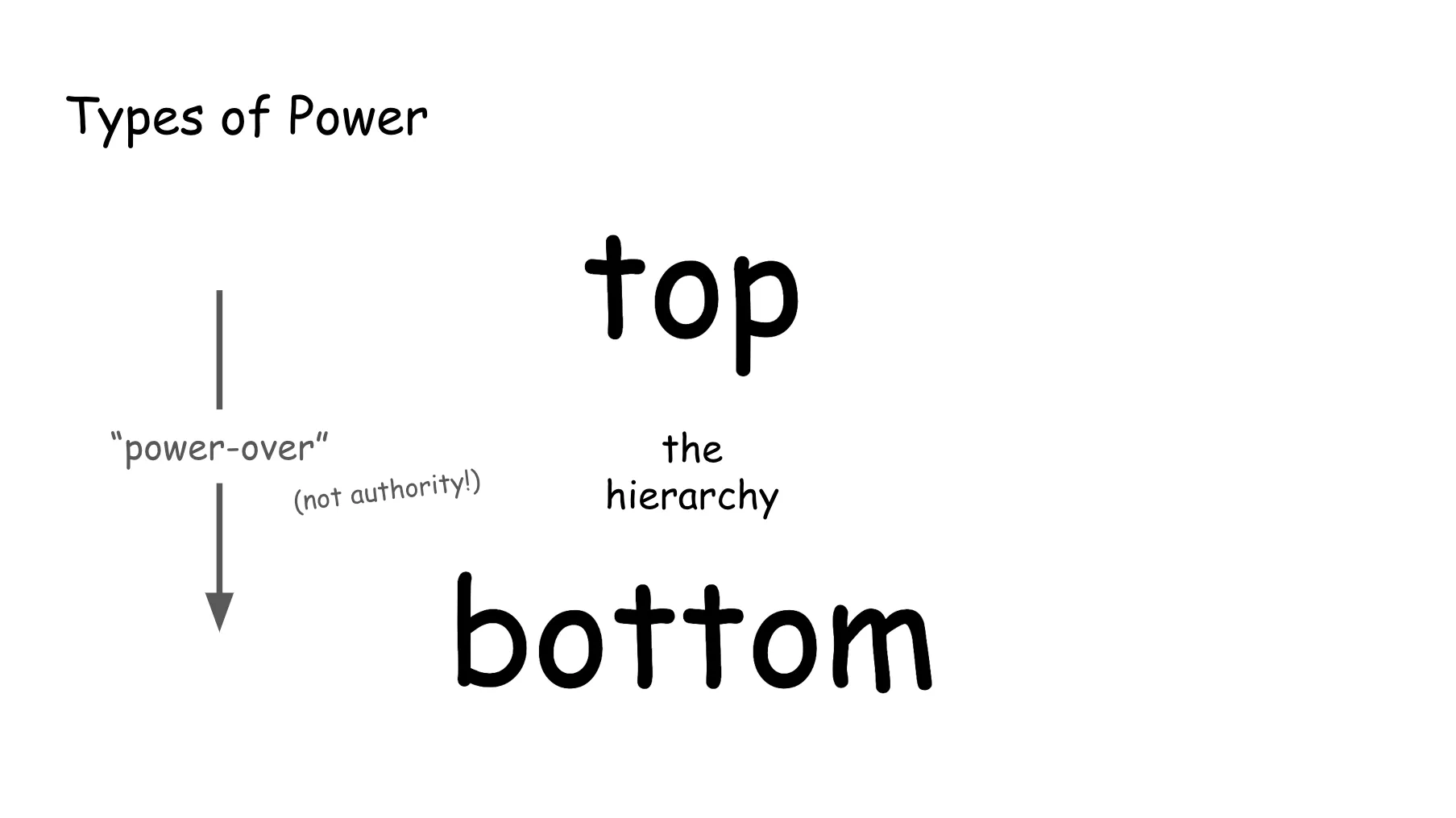
Power-over is often confused with authority, which is when someone with special context, expertise or insight has earned their position through experience and learning. The opinion of an authority may have more weight not because of their place in the hierarchy but because of their understanding of the situation. But this is only true in some contexts, and it can easily become power-over if authority exceeds its bounds.
Now, while we’re used to hearing about these types of power, we’re less familiar with others. In particular, there is one lesser-known type of power I believe is fundamental to understanding the dynamic in our spaces: power-under.
Power-Under

Power-under is power that flows in the opposite direction, where people at the bottom of a hierarchy wilfully avoid stepping into the power that they do have. Now since we often see power as inherently desirable, you may be confused by the idea of choosing to renounce it. But what we tend to forget is that with great power comes great responsibility, and responsibility can be incredibly uncomfortable.
![Slide 38. A quote from Steven Wineman's Power-Under: Trauma and Nonviolent Social Change: Power-under is [...] the power to maintain control of the victim role, creating a context of guilt and obligation.](/_astro/slide_38.K0ZBvObv_1RAGoB.webp)
When we renounce our responsibility and let others make decisions for us, we always retain the ability to blame them when they turn out to be wrong, when they were faced with impossible choices, or simply when we don’t like the outcome of what was decided. When we don’t take on responsibility ourselves, we can always say “I told you so” and believe we would have known what to do—and done it better.
By giving away their power, people also overpower others at the same time.
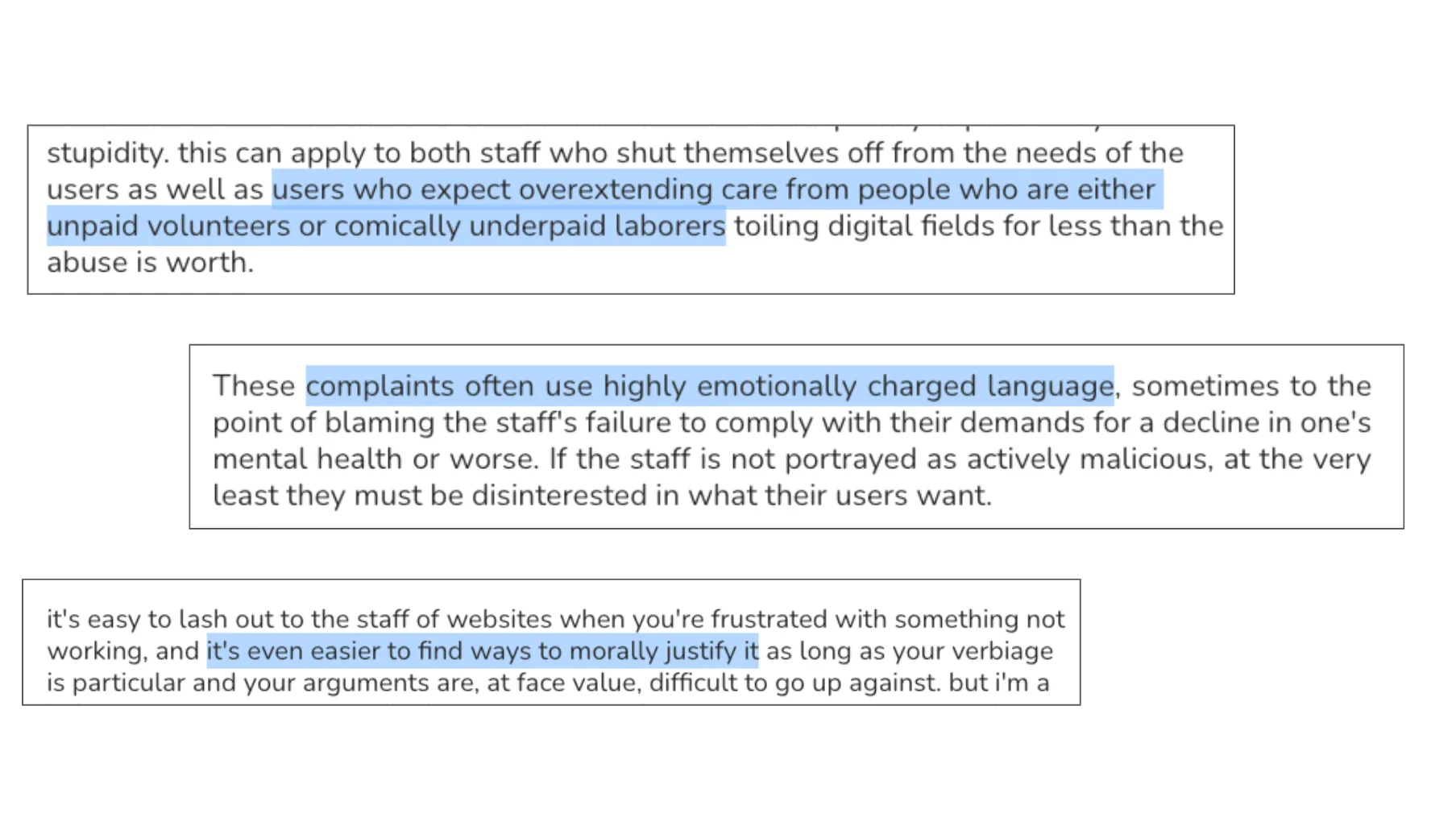
To show a neutral example, here’s quotes (presented with permission) from a Pillowfort thread I did not participate in myself. You can see people do recognize power-under, even if they can’t name it. And you can see how damaging it can be to small teams of folks trying to make a difference.
During rehearsals, I was asked to pause here to let people reflect. So let me drink a glass of water again.
— BREAK —
Now I want to be clear: just because someone is in a top or bottom position, this does not mean that they exercise these powers, do so all the time, or do so willingly. And power-under does not imply that people use it because they’re evil. Instead, it’s been most often observed as a trauma-response, especially in marginalized populations that may not often have access to “power-over”. So given what we know about the demographics that form our groups, you can see why it’s important that we discuss it and learn to recognize it.
Once you know about power-under, you can see it permeate not only our platforms, but our discord servers, fandom events, social movements and so on… and while you can see power-under morphing and getting worse as the web degrades, you can see it has been in our spaces way before this decline started.
Removing Hierarchy: Power Sharing
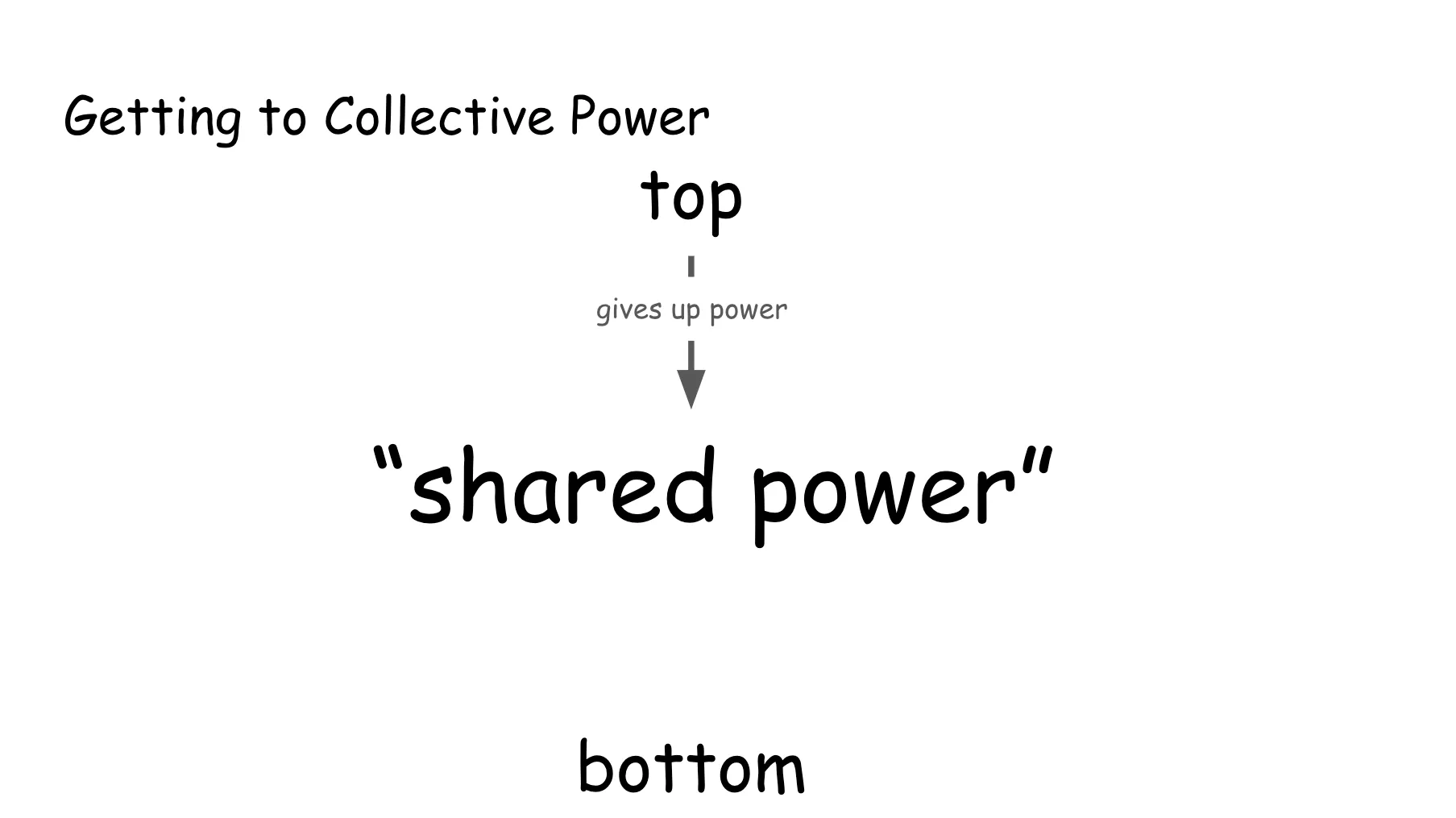
Now that you know about power-under, you can see removing hierarchy is not as simple as having those at the top give up power. To get equal power, those in power do need to step down…
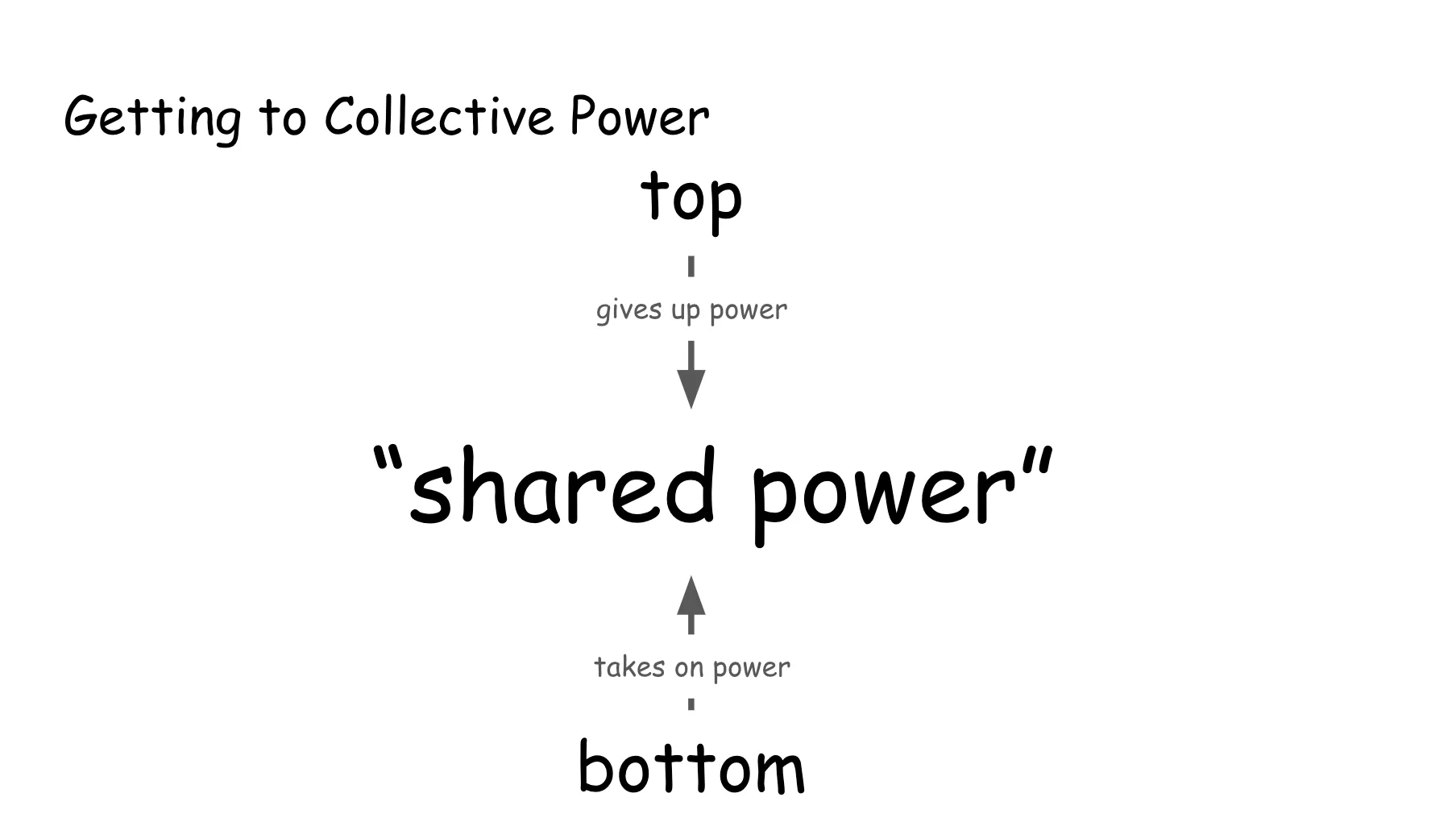
…but at the same time those with less power need to step up.
Collective power, power shared between platform users and builders, can only happen when everyone uses the power they have.
Who Can Take on Power? You (yes, you)!

Now, I’ve been around these spaces long enough to know what some of you are thinking: “well, this sounds great for people who do have power inside them, but this surely does not apply to me! I don’t have anything of value to contribute, and my personal life circumstances would keep me from participating anyway.”

This goes back to something I said before: for many different reasons, people sometimes see those of us working on these projects as inherently different. And when we discuss these differences, these are the points we most often see come up.
Before we go forward, an important reminder: it is not up to me to decide whether you can contribute or not. Nothing I say should be taken as implying anyone is making excuses. Your power or lack of it is for you to self-determine.
But I do believe it’s important for me to publicly spend some time talking through each one of these points, as my collaborators and I did privately after the Fateful Day™.
Having Nothing to Contribute
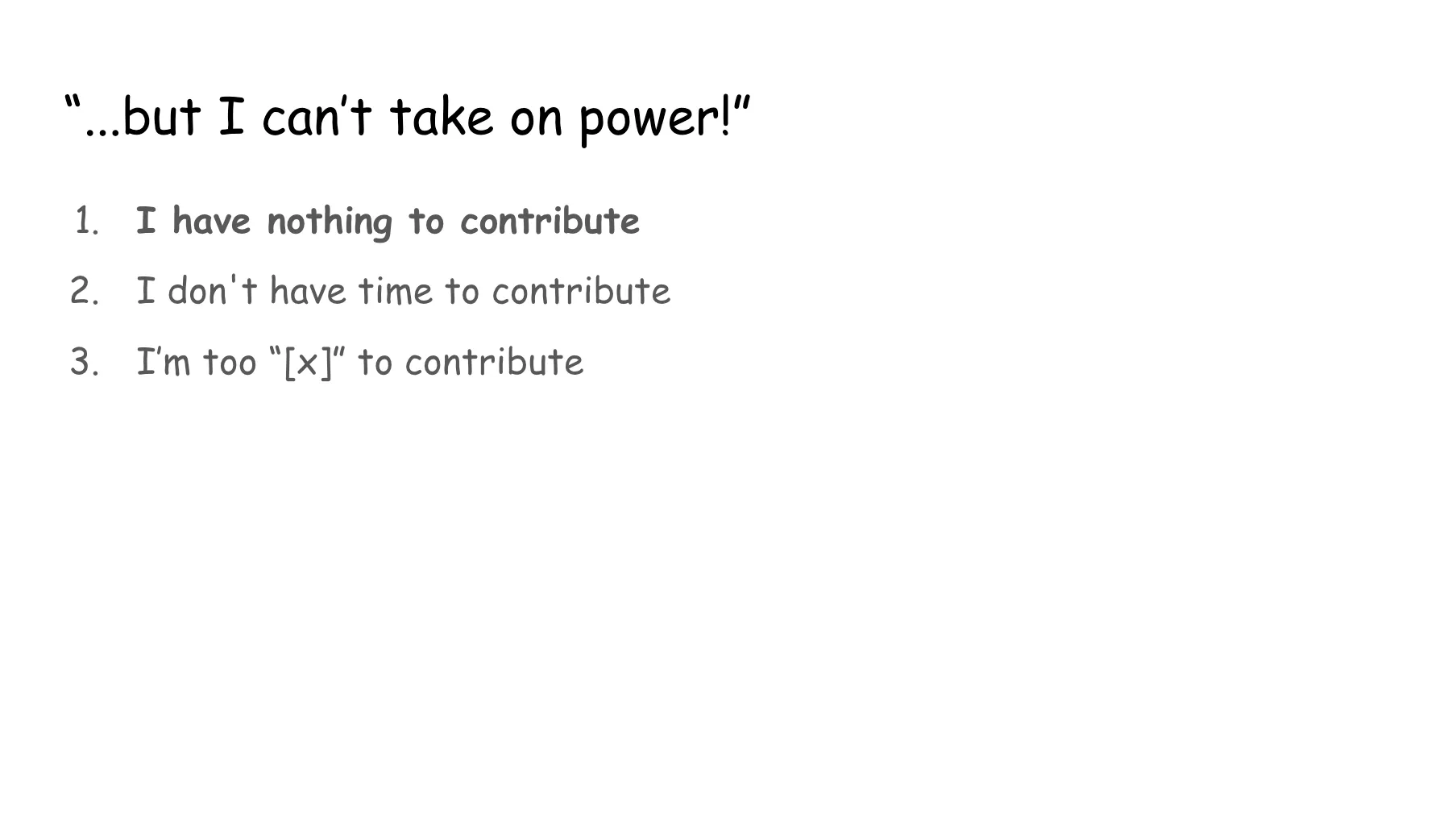
So, let’s go in order!

When we talk with people about what hesitations they have about joining our project, we often hear the same answer: “I don’t have any valuable skill to bring in, and all I’d do is bring everyone down”. Now, here’s the thing: when we think about hierarchy, we see there is not just a hierarchy of power in our society, but also a hierarchy of skills. Some skills are seen as more valuable than others, which are instead diminished and dismissed.
Since we tend to see skills as a fixed thing you either have or don’t have, this means that if there are valuable and useless skills, there also have to be valuable and useless people. But not only is that not true, that wildly misunderstands how skills are built and the type of skills a group needs to succeed.

Let’s take me as an example: there are some things I’m naturally good at. These include things like “software engineering”, “abstract math”, and “shitposting”. And I was lucky enough to be born in a era where my natural aptitude for computers made it possible for me to be regarded as a “highly-skilled professional”.

However, there’s also things I’m naturally terrible at, that I’ve only become (relatively) able to do through active learning or repeated practice. These include things like “business”, “marketing”, and “community building”.

And then there are things that I never have been able to practice, or that I still suck at despite trying and trying to get better at them. There are also things that, while I’m theoretically able to do well, take a disproportionate toll on me and quickly sap all my time and energy. These include “collecting notes after discussions”, “assigning people tasks”, and “entering data”.
Because of my position as one of the “doers” and because some of my natural skills are so high in the perceived hierarchy, I’ve found that people tend to assume that if I possess the skills at the top, then I must also inevitably possess those at the bottom. That couldn’t be further from the truth.
Very often when I talk to people about the skills I lack and what I’m desperately struggling with, I see a light bulb go off above their head: “oh, that’s not hard at all”, they say, “I love doing that type of task”, or (one of my favorite to hear) “I didn’t even realize that was a skill”.

So allow me my one swearword in this PG-13 talk: fuck the hierarchy of skills. To build successful projects we need many different types of abilities, all across that “so called” hierarchy. Just like we’d be unlikely to succeed without someone who knows software programming or without a good business plan, we’d also have a hard time going anywhere without the skills society tries to convince us are useless.
Some of the most impactful and positive contributions to our project have come from people who collected data, updated our socials, asked questions, and wrote alt-text for our posts and websites.
Having No Time to Contribute

Now, the second one: “I don’t have time”. This is completely understandable! Time (and mental space) are incredibly limited nowadays.
But just like we tend to think we need to have big skills to contribute, we also think that we need to do things that take a lot of time. And yet, there is something anyone running or joining projects needs that requires very little time to do…
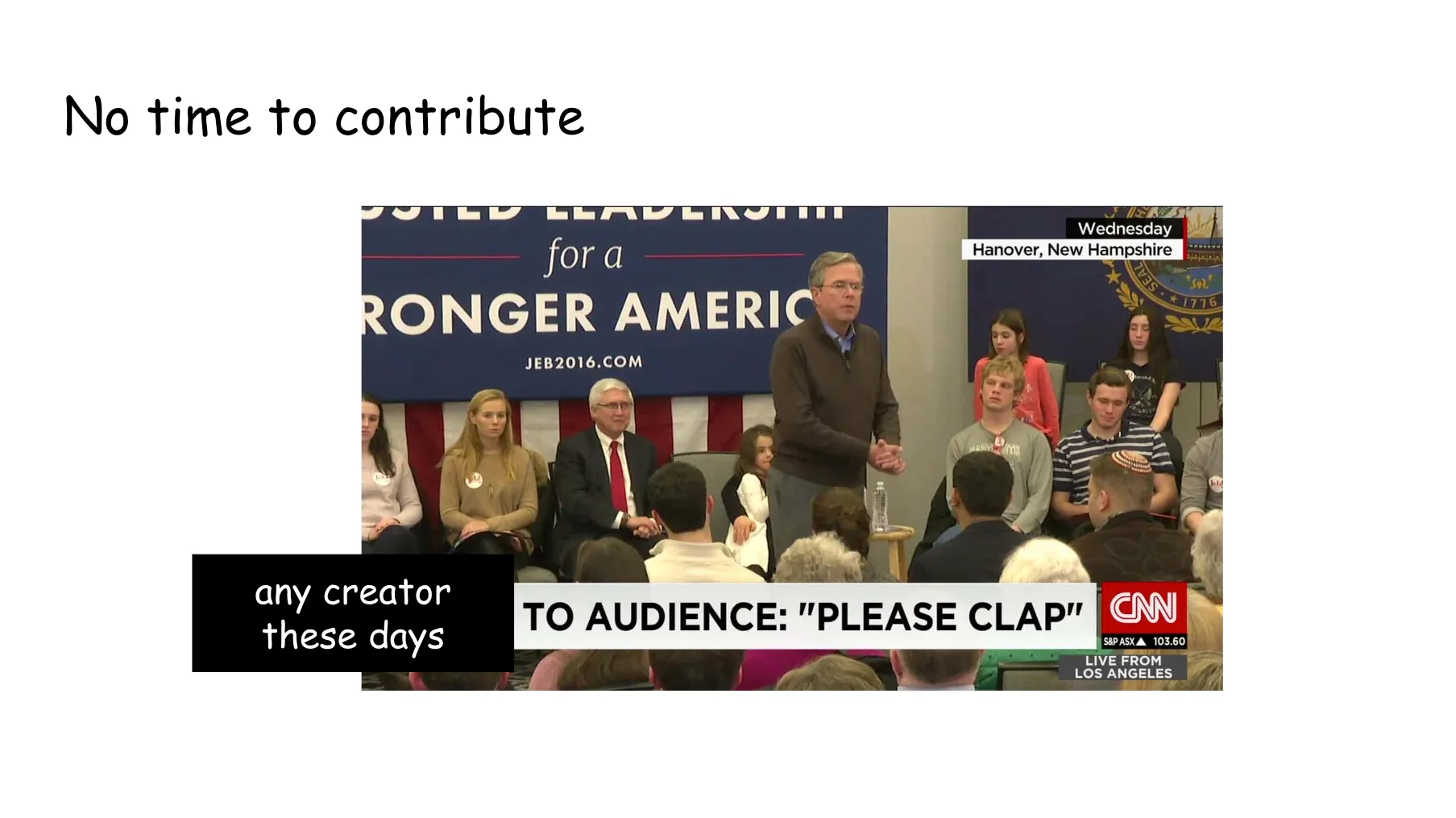
…and that is actively showing your support!
One of the hardest things any creator and platform runner deals with is complete silence. There’s nothing more alienating than doing things for an unresponsive audience, and not hear back until something needs fixing or changing.
Whether it is personally thanking someone who’s doing something in your spaces, gushing about their work with others, or boosting their posts on socials, interacting with people working to make your communities better is guaranteed to make their day, and doesn’t take much time.
Now you may think: but that’s so little! And, well, to be blunt it is! But this is where we’re currently at. I’ve heard this over and over from many sources: people who are doing essential work for the health of our fandom web and communities are struggling to get back even a simple “thank you”.
And if you want to do more start looking carefully at your spaces: you’ll soon notice small bits of work people may use help with that no one else is taking up. Here’s some examples I was given of requests that often go unheard:
- helping to choose the day an event should be held on and creating a calendar invite
- submitting ideas for a “question of the day”
- saying hello to new members joining a Discord server, or
- helping fill entries in a community wiki.
You may not be the perfect person to help with any of these, and yet you may be the only one doing so!
Being too “[x]” to Contribute
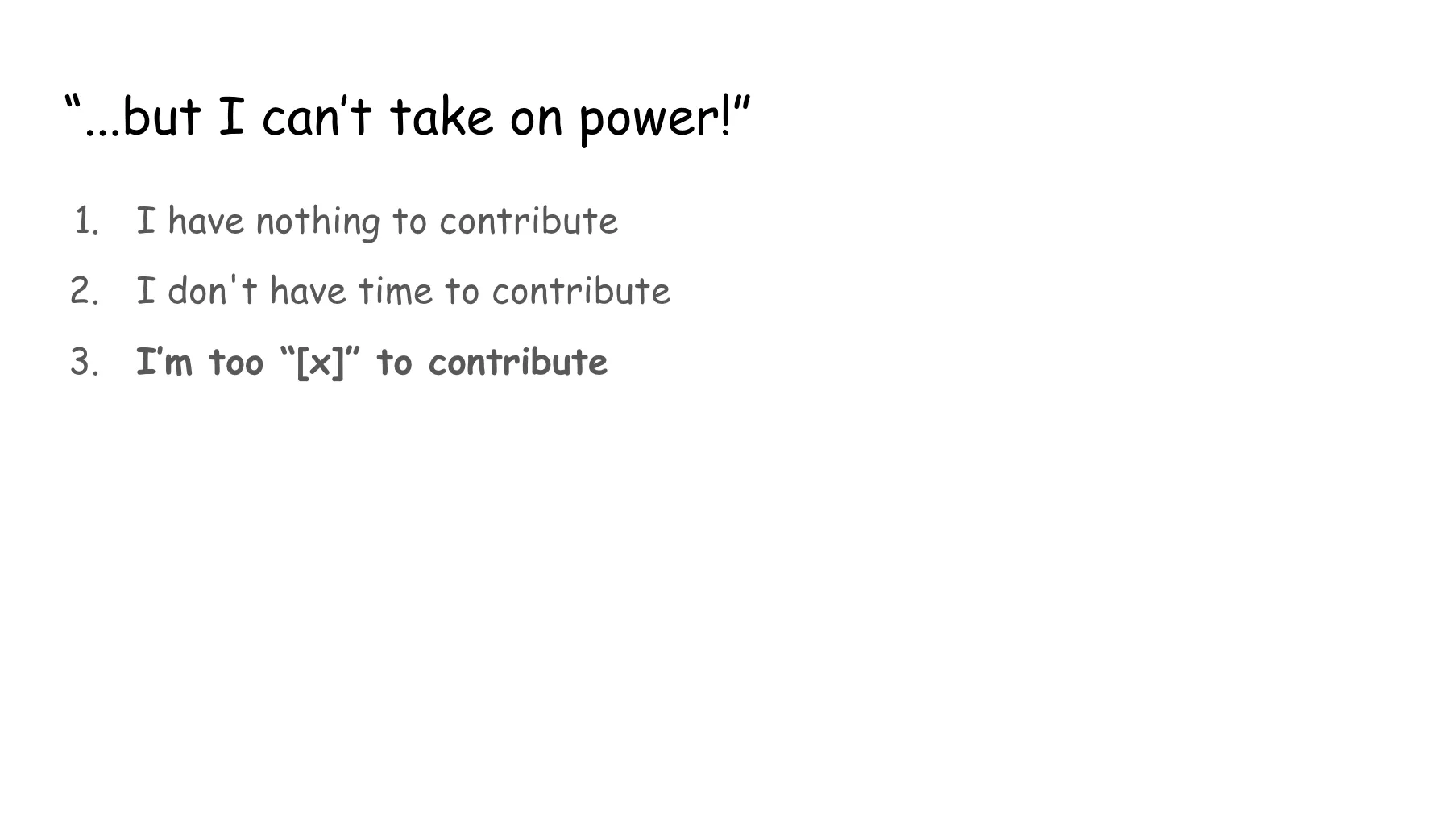
And now the hard one…

This is something that’s very hard to talk about, and I wish I had had more time to have many people review my wording and be confident I’m conveying the right amount of nuance with the perfect phrasing. Unfortunately, this talk took way too long to prepare, and the time for this topic is shorter than ideal.
Remember I speak as an inside ambassador: some of our most important collaborators have disabilities that significantly impact their lives; some of our collaborators have had significant life and health events; a lot of our collaborators struggle with mental health, to the point that we have (as someone defined it) “a bingo-card of mental illnesses” among our team; and obviously some of our collaborators are poor, overworked, and in generally difficult life situations.
When those of us who face these struggles have talked about contributing with people in similar situations, we’ve repeatedly encountered something we believe needs to be talked about.
Learned Helplessness
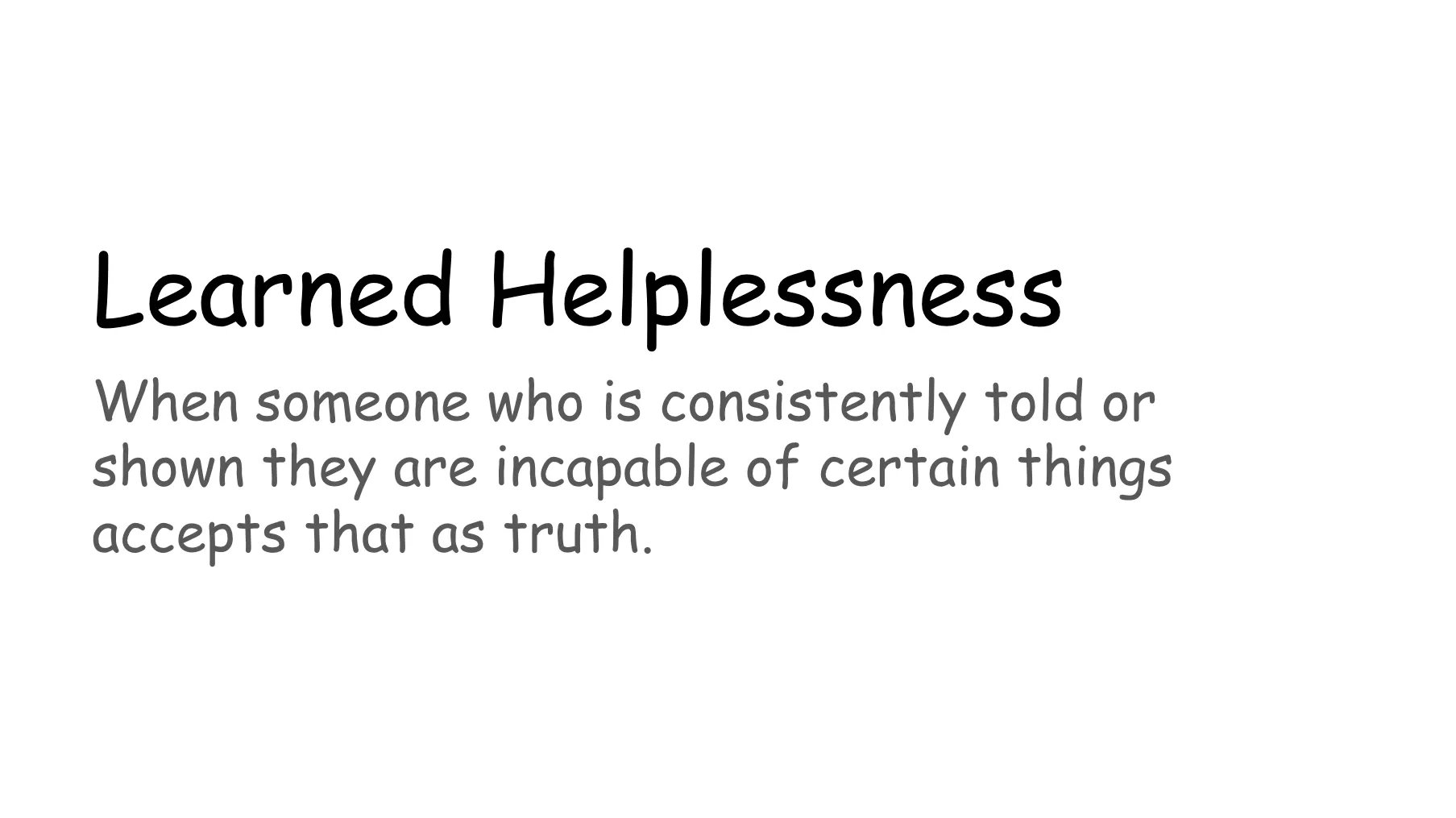
And that is learned helplessness. Here’s what this may look like:
- Maybe we fail to meet a deadline for reasons we even struggle to explain, and feel the weight of the other person’s disappointment, or worse we get yelled at. So we stop showing up for tasks with deadlines.
- Or maybe we see someone effortlessly breeze through tasks we don’t even know how to start with, and when we struggle with the same we get the task taken away, or worse get mocked for our inability to complete it. So we stop showing up for tasks that are hard.
- Maybe we’re told people like us will always struggle, so we come to believe that we will never amount to anything.
The trauma of learned helplessness builds up slowly, over time. Eventually, we stop believing we could ever meaningfully contribute to our projects and our communities.
While everyone’s life circumstances are different, I’m here to tell you: it may come with unique challenges, it may not be easy, you might need support and encouragement and a safe space to fail, learn, and get up to try again, but *all of us have the power to show up and make a difference.
Power Types Encore: Power-Within

And this brings us to the last type of power of today: power-within. ower-within is what happens when we’re able to step into our own agency, see that we are capable, and believe (or even better know) that we can meaningfully contribute to our collective.
During this journey, we’ve met many people struggling with learned helplessness and saw them overcome it to reach power-within. When this happens, people are transformed. They often go from timid and hesitant to eagerly volunteering their skills and opinions. They learn to say, “I don’t know if I can do it, but I will try”. They learn to recognize when a task does not play to their strengths, and see failure as an inevitable condition for growth rather than a personal defeat.
Even more importantly they go from needing encouragement, to giving encouragement.
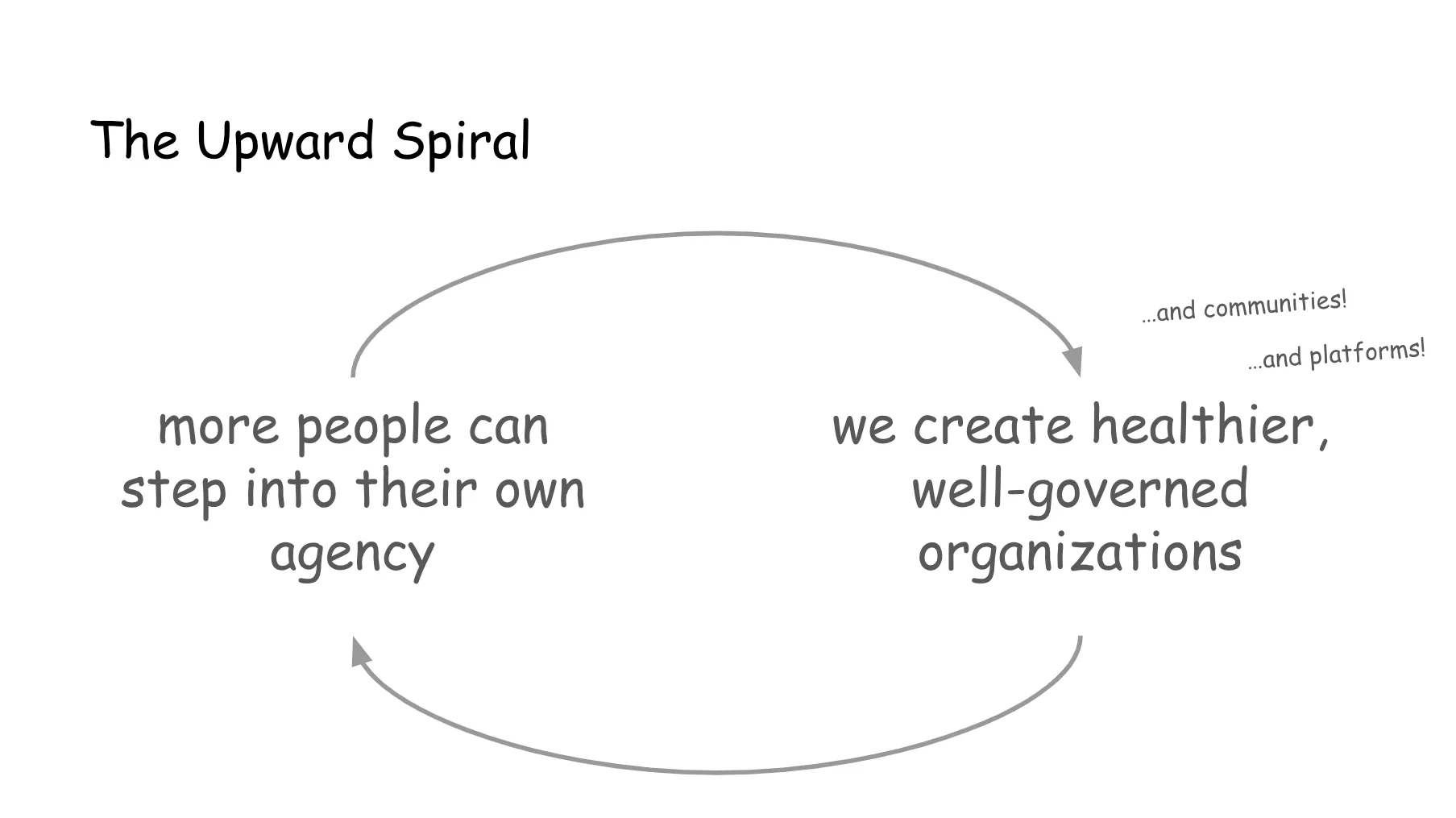
Helping people step into their power is hard work, and not everyone can do so within organizations as messy as the ones that exist today. But that makes it even more important that those who can show up for this stage of the journey help us create an upward spiral that counters the cycle of hopelessness we’re currently stuck in. More than any piece of software this is what will rebuild our communities.
Because real community happens when people help each other become who they want to be; when people come together to share information, skills, hard-won lessons, attentive care, and above all friendship; and, when in the process of doing so, people create something that is bigger than the sum of their parts.
…In The Next Episode of “Rebuilding Community”

…or follow me on socials to keep in touch! And if you want to hear this tale told by my angelic (not really) voice, find the full recoding on YouTube.
Before You Go:
Did this talk make you think, “wow, I sure wish I could help, maybe by giving some of my hard-earned money to a project that’s all about helping communities rebuild a sustainable internet”?
Well, you’re in luck: you can support FujoCoded LLC on Patreon today!
Footnotes
-
From the previous part: “On Nov 9th, 2023, three different project runners published three different posts talking about the unsustainable mental and physical toll that their projects had placed on them.” ↩